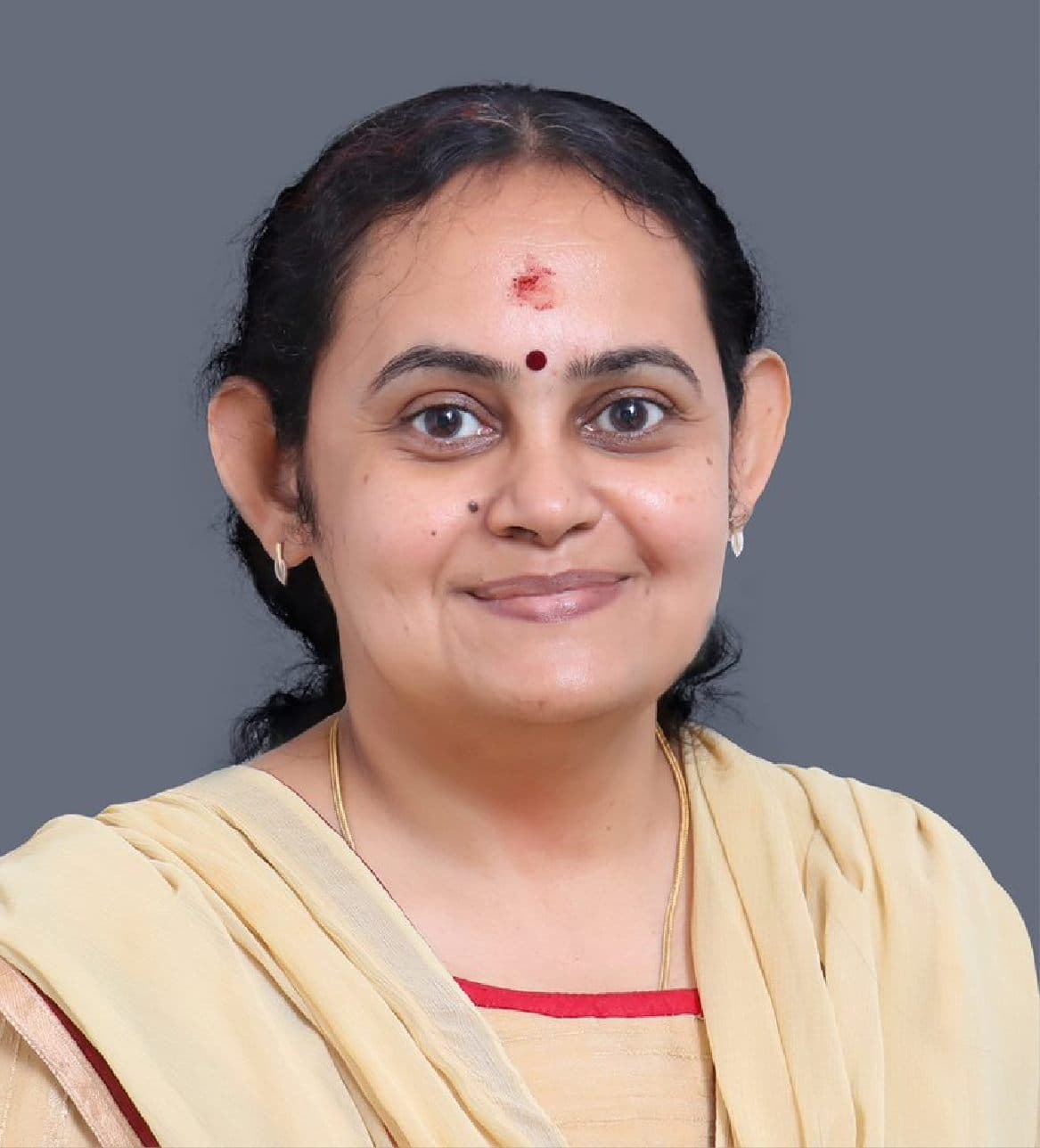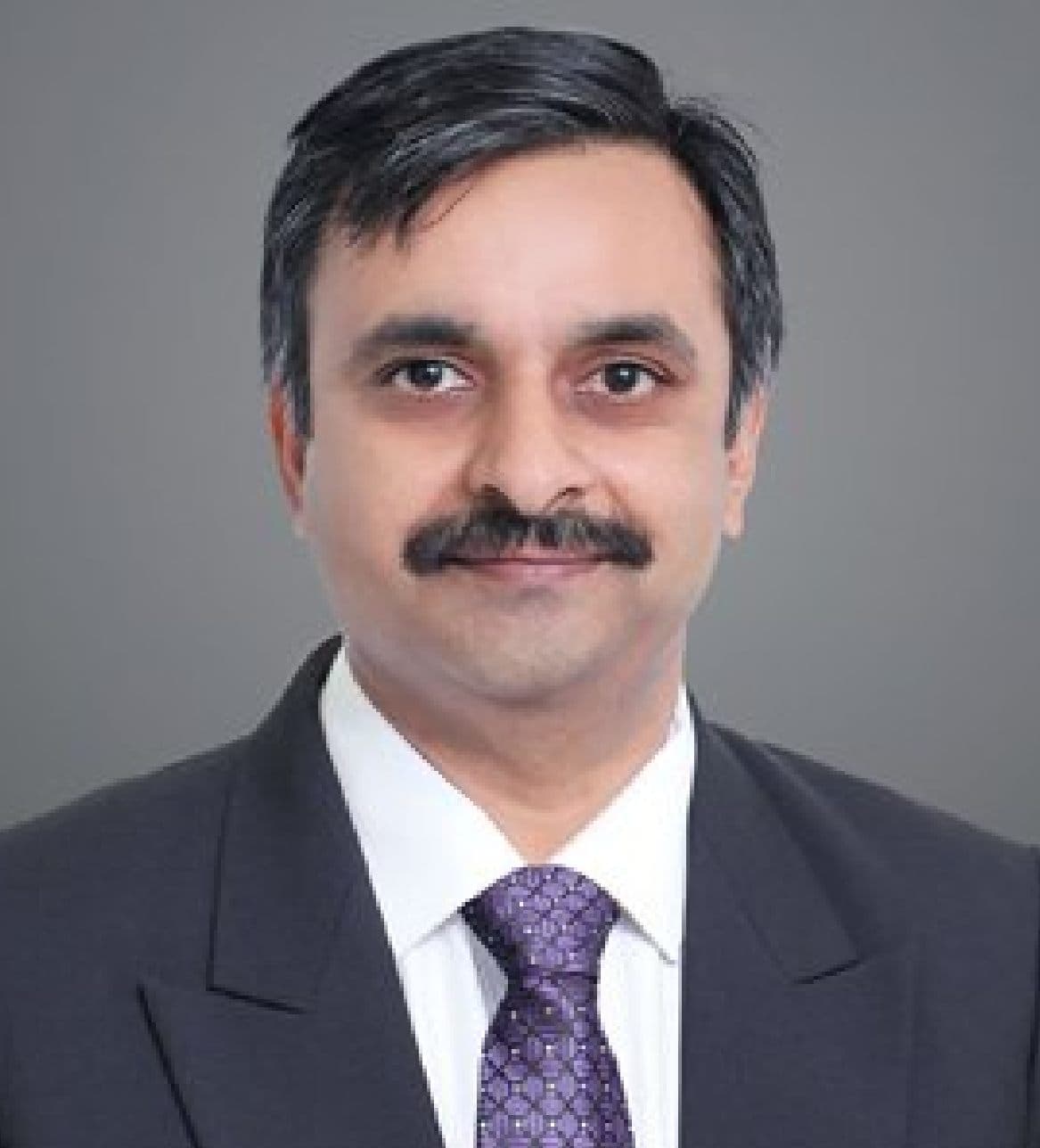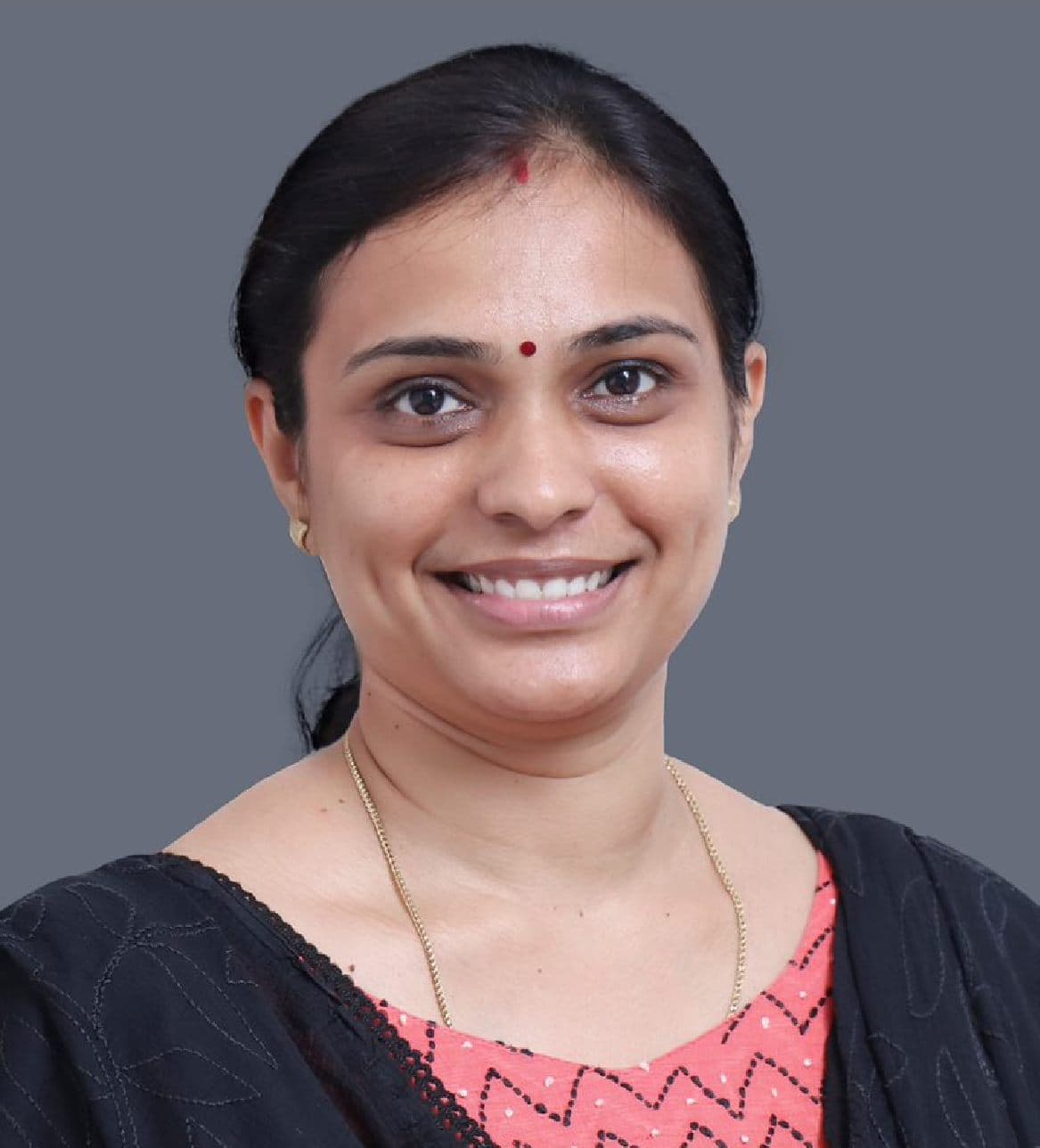Overview
Since its inception in April 2002, the Department of Neonatology, accredited as Level III by the National Neonatology Forum in India, serves as one of the largest referral centres in India for high-risk neonates. With the availability of all Paediatric medical and surgical sub-specialities, we are able to cater to every need of the neonate in our Neonatal Intensive Care Unit (NICU).
Achievements
- The smallest newborn to have survived in India till 2014 was from our unit. He was born at 23 weeks 6 days and weighed 390g at birth.
- In 2019, Baby of R (photo shown in Gallery) became the smallest infant in India to be born with a weight of 370 grams.
- First in India to diagnose a neonate with Ondaine’s curse (Congenital Central Hypoventilation Syndrome). The child was sent home on tracheostomy with home ventilation during sleep (2013).
- In 2014, we treated an extremely rare case of neonatal Autoimmune Lymphoproliferative Syndrome, which was probably the first of its kind in India. The neonate had in-utero features of the disease and was treated with Sirolimus.
- A referral center for congenital diaphragmatic hernia in India and neighboring countries.
- Our survival rate of CDH is 73.4%, which is comparable to the Western standards.
- Collaborated with Pediatric surgeons to perform India’s first Ex-Utero Intrapartum Treatment (EXIT) procedure for an infant with Congenital High Airway Obstruction Syndrome (CHAOS).
- First center in Kerala to start a EEG monitoring and video EEG in Kerala.
- First center in Kerala to start a hearing screen (AEBR) in the Neonatal unit.
Specialities
- All high-risk deliveries are attended by a team of Neonatologists and neonatal nurses. Our Delivery Suite is well equipped to manage any high-risk deliveries.
- Together with the Obstetricians and Perinatologists, we function as a close-knit multi-disciplinary team; thus, preparing us to anticipate and deal with any sort of emergency prior to the delivery.
- Our transport team (a neonatal trained doctor and emergency medicine trained staff) transports sick out born infants to our unit in a dedicated transport incubator with portable ventilator via ambulance. We also receive tiny tots from both neighbouring Indian states and other countries as well.
- All modalities of invasive and non-invasive ventilation are carried out in our unit.
- In critically ill new-borns, surgeries such as congenital diaphragmatic hernia (CDH) repair, laparotomy for intestinal perforations and even closure of patent ductus arteriosus (PDA) are performed at the bedside in the NICU itself.
- Due to the back-up of a staunch team with state of the art facilities, certain medical and surgical congenital conditions such as Posterior Urethral Valve (PUV), fetal anemia, complications from multiple pregnancy (for example, twin to twin transfusion) and other diseases are taken care of in-utero itself, on the fetus, with the collaboration of the Neonatologists, Perinatologists, Fetal Cardiologist, Fetal Surgeons, Anaesthetists and Obstetricians of our hospital. We were the first in the country to perform Ex-Utero Intrapartum Therapy (EXIT).
- With a vast experience in the management of CDH, the survival statistic of our neonates is akin to Western standards (73%). We are one of the few centres with a focus on Fetoscopic Endoluminal Balloon Tracheal Occlusion (FETO) as an in-utero fetal management for CDH.
Features
The Newborn Care Unit of Amrita Hospital, Kochi, has emerged as one of Kerala's premier referral centers for high-risk neonates, extending specialized care to preterm infants as young as 23 weeks of gestation.
We house 30 neonatal beds, designated as16 intensive care, 6 high dependency and 8 step-down. Our comprehensive care boasts of a complete array of pediatric medical and surgical sub-specialties, ensuring that every requirement of these delicate infants is addressed.
Out Patient Services
- Neonatal Clinics:Our outpatient services encompass a wide range of specialized care for both inborn and out born infants through our Well Baby and High-Risk Clinics.
- our patients are babies: Our offerings include comprehensive breastfeeding classes, antenatal counseling, thorough newborn examinations with anthropometric measurements, essential vaccinations, and access to laboratory services and pharmacy facilities.
- Additionally, we collaborate with hearing assessment clinics (Oto-acoustic Emissions- OAE and Brainstem Evoked Response Audiometry- BERA), and Early Intervention and Neurodevelopmental clinics to provide holistic care.
- On specific days, we offer specialized clinics like the brachial plexus clinic and swallow assessment clinic.
- Furthermore, we team up with various pediatric sub-specialties, ensuring comprehensive care for your child's specific needs.
- Neurodevelopmental Assessment Clinics: In our Early Intervention Clinic, we welcome high-risk newborns up to 3 years of age. Developmental assessments using BSID III and DASII tools are conducted on Thursdays and Saturdays in our Developmental Assessment Clinic. During each visit, we meticulously assess milestones and growth percentiles, promptly identifying and addressing developmental delays or disabilities. Our commitment to family-centered practice means we empower parents with the necessary skills to perform therapy at home, creating an environment that nurtures their child's growth and development. With our support, your child can acquire new skills, conquer challenges, and pave the way for a successful future.
In Patient Services
The unit comprises of an Intensive Care Unit, a High Dependency Unit and a Stepdown NICU, staffed by a whole-hearted team of neonatal doctors, nurses, respiratory therapists, early interventionists, nursing assistants, a medical social worker and supporting staff member's available full time.
We offer multidisciplinary prenatal counseling services and maintain continuous availability to respond to high-risk deliveries and emergencies in both the NICU and other areas of the hospital.
The following are some of the highlights of our services: -
- The team manages infants from 23 weeks of gestation (our smallest survival had a birth weight of 370g, and lowest gestation was 23 weeks, 3 days of age).
- Round the clock accessibility of a Neonatologist in the NICU.
- Our advanced ventilators provide all modalities of ventilation including high frequency oscillatory ventilation (HFOV), with provision for inhaled nitric oxide therapy (iNO).
- Extracorporeal membrane oxygenation (ECMO) is also available with the support of the Pediatric CVTS team.
- Surgeries for critically ill babies and extremely premature infants are done within the unit itself.
- In house amplitude electroencephalography (aEEG) and video EEG recording with provision for whole body cooling as a management for hypoxic ischemic encephalopathy.
- Daily Early Intervention therapies for our high risk neonates by our Neurodevelopmental therapy team.
Why Choose Us
With us, your little one will experience the safest and highest quality healthcare. By aiming for the lowest morbidity and mortality, we cultivate an environment wherein every need of your baby is met fastidiously.
- Family centered care with health care providers (physicians, nurses, respiratory therapists, early interventionists, social workers) working as a team to achieve a survival of a newborn without residual handicaps
- 30 neonatal beds including isolation facilities to manage infectious pathologies.
- All high-risk deliveries are attended by a team of Neonatologists and neonatal nurses.
- All modalities of ventilation including high frequency oscillatory ventilation (HFOV) and inhaled nitric oxide therapy are carried out in our unit.
- In critically ill newborns, surgeries such as congenital diaphragmatic hernia repair, laparotomy for intestinal perforations, closure of patent ductus arteriosus are performed in the NICU itself.
- Although we prefer in-utero transfers, our transport team (a neonatal trained doctor and emergency medicine trained staff) transports sick out born infants to our unit in a dedicated transport incubator with portable ventilator.
- We also receive tiny tots from both neighbouring Indian states and other countries as well. Together with the obstetricians and perinatologists, we function as a close-knit multi-disciplinary team; thus, preparing us to anticipate and deal with any sort of emergency in the delivery suite.
- The backbone of this ICU is a team of extremely devoted nursing staff and our enthusiastic medical social worker; who are always willing to take up additional responsibilities at any time, three hundred and sixty-five days of the year.
What we Offer
The backbone of the department is a team of extremely devoted nursing staff and our enthusiastic medical social worker; who are always willing to take up additional responsibilities at any time.
- Our responsibility towards the NICU graduates goes beyond home discharge. We regularly do follow-ups for neurodevelopmental evaluation and even enrol them in the early intervention program prior to discharge.
- The outcome of our infants is comparable to international databases. Naturally, inborn infants have a slight positive edge over out born infants in terms of outcomes with lower morbidity and mortality.
- We encourage a family centred care with health care providers (physicians, nurses, respiratory therapists, early interventionists and social workers) working as a unit to achieve a survival of a newborn without residual handicaps.
- As several of our referred patients have extremely complex medical and surgical problems, it will not be surprising to see an infant being taken care of by several consultants of various paediatric subspecialties in unison. This teamwork approach is the reason for the successful outcome of our patients.
Our Philosophy
Vision
Our infants always experience the safest, highest quality, best value health care across all settings in our NICU.
Mission
- To continuously improve health care for the infants in collaboration with other divisions or departments.
- Monitor the morbidity and evaluate the outcome of the infants admitted to our NICU.
- Incorporate the cutting-edge technology and new scientific information into clinical practice.
- Institute continuous quality assessments and explores importunities for improvement in clinical care.
- Provide compassionate and family centered care to the patients in the NICU and inspire every healthcare provider to excel in providing safe and effective care of the highest quality and value.
Academy
- Accredited by National Neonatology Forum (NNF), India as Level 3 NICU.
- Our NNF fellowship program accepts two trainees annually. We have achieved 100% pass in the fellowship exams conducted by the NNF board.
Facilities
- Provision of both non-invasive and invasive ventilation by our Neonatal transport ventilator with twenty-four-hour-a-day ambulance services.
- Tecotherm machine that delivers Therapeutic hypothermia (whole body cooling) with aEEG monitoring and bedside video EEG recording.
- Sophisticated point of care testing that analyses blood gases and coagulation profile.
- Portable equipment including x-ray and ECG machines.
- Bedside scanner for echocardiograms (ECHO) and ultrasounds (USG).
- USG guided procedures that include central venous and arterial line placements.
- A devoted cytogenetic lab and advanced molecular diagnostics including PCR, inborn errors of metabolism tests and Genetic analysis.
- Centre for advanced fetal diagnostics and therapy (Fetal medicine and Fetal surgery).
- Outpatient and bedside consultations from our in-house clinics specialized in our field, such as Cardiology, Pulmonology, Endocrinology, Nephrology, Gastroenterology, Hematology, Neurology, Dermatology, Genetics, Radiology, Pediatric Surgery, Cardiovascular Thoracic Surgery, Neurosurgery, ENT, Ophthalmology including Retina eye specialists, Orthopedics, Plastic Surgery and Maxillofacial Surgery.
- Availability for bedside consultations with the Neonatal swallow assessment clinic and Brachial plexus clinic.
- Availability of chest physiotherapy by our committed respiratory therapists.
- Apart from the routine neonatal care and management, we also have facilities to perform exchange transfusions for hyperbilirubinemia, lumbar punctures, catheterisations of umbilical blood vessels and peripheral arteries, and chest drain insertions for management of pneumothorax (air leak), chylothorax and pleural effusions.
- Isolation facilities to manage infectious pathologies.
Fellowship Programmes/Trainings
We offer the following Neonatology training courses for Pediatricians- post MD and DCH:
- Two-year fellowship in Neonatal Critical Care under Amrita Vishwa Vidyapeetham University.
- National Neonatology Forum accredited fellowship (12 and 18 months of duration for MD ad DCH candidates respectively).
- One-year Neonatal Advanced training course (Post-Doctoral Certificate Courses).
Gallery
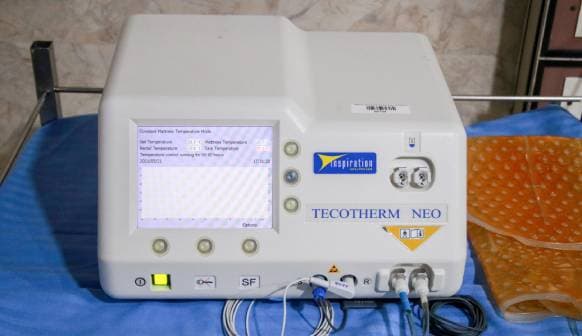



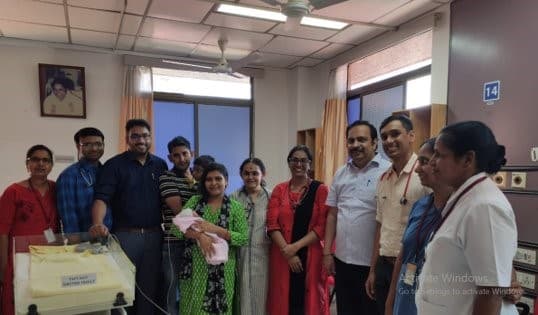

FAQs
The following information are for parents with regards to management of Extreme prematurity and Congenital diaphragmatic hernia.
Information for parents of babies born below 29 weeks of gestation
Being informed that your baby might be born early is frightening, more so, if you do not know what to expect for your child.
A normal pregnancy lasts for 40 weeks. From 37 weeks onwards, the pregnancy is designated as ‘Term’. If your child is born less than 37 weeks, it is a preterm delivery. If the delivery takes place under 28 weeks, it is named ‘Extreme prematurity’.
We have experience with resuscitating babies as young as 23 weeks gestation. Unless it is confirmed that care of the baby is futile (for example, the fetus has a proven severe congenital anomaly to which providing treatment is vain), all babies above 23 weeks, born in our institute, are resuscitated at birth. With intensive medical treatment most babies survive.
The big picture
The question always arises on how your child will be in the future; will they be able to attend school, do sports, etcetera. In Amrita Hospital, Kochi, we try to achieve this with minimal residual disability. Each day that the fetus gets to live, inside its mother’s womb, is a day more for organ development. A baby born between 26 and 28 weeks of pregnancy will have a higher chance at survival (roughly around 80%) than one born below 26 weeks. Every baby will require intensive care treatment after birth and a strict neurodevelopmental follow-up after discharge.
The birth of your baby
Doctors and nurses specialized in care of high risk babies will be present in the delivery suite or operating room. Your child will be gently wrapped to maintain warmth and brought to a special bed. On this bed your baby will be cared for. A mask may be put on the face to help your baby’s lungs to expand and thus breathe. A constant flow of oxygen may be required as per the baby’s needs. Sometimes a breathing tube might also be desired if your child needs help to breathe. In rare occasions, your child may require additional help in the form of chest compressions and medicines to stimulate the heart. If no help is required, your little one will be given ‘CPAP’ and transferred to the Neonatal unit. As we are aware of your anxiety, both the mother and father will be shown the baby and a family member will accompany us during transfer.
Your baby will be placed in an environment that is specially crafted to mimic the mother’s womb. This way the child will continue to grow amongst the soft lights and sounds and not realize that he or she is already born.
Breathing
For a while your baby will need help to breathe, through a ventilator or a ‘CPAP’ or ‘High Flow’. They may require a specific medicine called ‘Surfactant’ that will help the lungs to expand. The baby will have blood tests to determine the way of breathing. If your child needs many blood tests, a customized tube will be placed into an artery to avoid many needle pricks.
Feeding
Babies born this early can be quite sick for a while. They may have difficulty in digesting their milk. It may take a few days before your baby can be given small amounts of milk. As they cannot feed by mouth, the milk will be given through a thin tube that will be placed from the nose or mouth to the tummy, called Nasogastric tube.
As breast milk is the best and natural sustenance, we recommend the mother to start expressing or pumping her milk as soon as she recovers from the delivery. Many centers even request mothers to begin expressing before the baby is born.
Until your child can take full feed, a unique fluid will be given through a specialized tube into your baby’s vein. This ‘banana bag’ is a customized regime that will specifically cater to your baby’s nutritional needs. By this, your tiny tot will grow stronger and healthier. A few blood tests will be done in between to determine the correct amount of nutrients required for the body.
As your child grows, they will need less breathing support, less blood tests, and less wires and tubes. As they become stable, these babies will be graduated to our High Dependency Unit and then to our Stepdown ward, where mothers can sleep with their babies and be completely involved in their care.
Preterm babies born this early often have some problems. There are problems that affect them when they are small and others that occur later in life. Your child may have none of these or several of these.
Lung problems
The baby’s lungs are not fully developed and are very delicate. They can develop scarring or damage to their lungs and become dependent on oxygen for weeks or months. These lungs can improve with time and adequate nutrition. This is called Bronchopulmonary dysplasia (BPD).
Heart issues
Your child may develop low blood pressure that require medicines to treat. This is to make sure there is enough blood supply to the rest of the body. They may also have difficulties in the closure of a certain blood vessel called ’the duct’ (patent ductus arteriosus- PDA) that lies close to the heart. Normally the duct closes after birth but in premature babies they usually stay open and may need medicines (or rarely a surgery) to close it.
Brain matters
Babies born this early may develop damage to the brain because of problems with the supply of blood and oxygen. While some babies develop a bleed called Intraventricular haemorrhage (IVH), others might develop a certain injury from lack of oxygen, or both. These are usually picked up by an ultrasound; your child will have the first one after a week of life and will be repeated thereafter depending on the findings. Mild types of bleed are not a problem; however, serious forms could cause learning or movement difficulties later in life.
Infections of blood or bowel
Your little one is susceptible to infections as the immune system is not strong. The infection can also affect the bowel and cause feed problems, sometimes an operation may be required to treat it.
Eye problems
The back of your baby’s eye ‘Retina’ is still in a developing stage. Sometimes the blood vessels on it may grow abnormally, to create a condition called Retinopathy of Prematurity (ROP), which can affect the vision. An eye specialist will visit your child to perform eye examinations and decide on its management.
Difficulties later in life
Not all children develop health problems or disabilities later in life. We have summarized below the types of concerns you may come across.
Movement
Damage to the brain can cause problems with movement later in life. The muscles can be stiff or hard to control. This can be managed with regular physiotherapy and neurodevelopmental follow-ups.
Learning
Since the baby’s brain is still growing and developing in the last months of pregnancy, your baby, who is born early, will need to do this outside the womb. These children may be slower in learning and development than children who were born on time. They may need extra help with their schoolwork. Problems with attention and behavior may also happen.
Disability
Disability means a problem that affect’s someone’s ability to do everyday things. This can be either mild or severe. We understand that the possibility of your child becoming disabled later in life is scary or very upsetting. It is imperative to know that with support, people with disabilities are often able to do most things just as well as those without disabilities. We cannot stress enough on the importance of neurodevelopmental follow-ups. In the Developmental clinic, our Early Interventionist patiently sits with parents and teaches them exercises and brain stimulating maneuvers to help their children develop.
Apart from care of extreme preterm neonates, one of the diseases our center frequently encounters is the Congenital Diaphragmatic Hernia (CDH). Since we understand how confusing and stressful this entity could be, we have prepared a brief description of it.
The diaphragm is a curved muscle which sits on the upper chest. Its role is to help in breathing. It separates the organs in the abdomen (tummy) from the chest.
A diaphragmatic hernia occurs when a hole occurs in the diaphragm.
This opening can allow the abdominal organs to “herniate” into the chest cavity, causing problems for growth and development of the baby.
The herniation of the abdominal contents into the chest cavity can cause underdevelopment of the lungs. This can cause significant breathing issues at birth and long term. Children with CDH require specialized care like assistance with breathing, surgery to repair the CDH, and long-term health care.
Yes, it can be diagnosed in the fetus by ultrasound. Fetal Echocardiography and fetal MRI are needed to evaluate the severity of disease and to make recommendations for prenatal and postnatal care aimed at ensuring the best possible outcome.
There is no known way to prevent CDH from occurring.
Yes, but only through surgery. If not treated, your baby will have repeated problems of breathing and feeding that will affect the growth and development.
No, you need not. Babies with CDH usually do not feed by mouth for the first several days to weeks of life, however breast pumping and storing milk can be arranged and given to the baby once feeding occurs. Eventually, feeding at the breast may be possible. Breast milk contains important nutrients for the baby and therefore breast feeding is encouraged.
Not necessarily. Your full evaluation will include recommendations on mode of delivery aimed at optimizing initial outcomes.
If the diaphragmatic hernia is detected before birth, your baby will need to be delivered in a multi-specialty hospital with 24 hours services. In the Delivery Suite, a breathing tube will be placed into the baby’s throat, along with a feeding tube into the tummy. This is to help the baby to breathe. To make this comfortable, a medicine to put your baby to sleep will be given at the same time.
In the neonatal unit, your baby will be put on the ventilator and will be monitored for a few days before surgery. A monitor will be connected to the baby that will tell us the heart rate, blood pressure and the amount of oxygen in the blood.
This is a crucial period; during this time there will be no feeding, your child will receive all nutrition from a fluid mixture directly into the big veins and medicines will be given to help in blood circulation.
If the hernia is diagnosed after birth, your baby will undergo the same procedures as described above. The operation will only happen after your baby’s breathing and blood circulation is stabilized. This may take 3-7 days depending on the clinical condition.
During the operation your child will be asleep from the general anesthesia. The surgeons will identify the hole in the diaphragm and bring the abdominal organs into the abdomen. Based on the defect they will decide whether a special patch is required to close it. The type of surgery (whether it is open or keyhole) will be decided prior to surgery. Both the anesthetist and the surgeon will discuss with you in detail before the commencement of the surgical repair.
After the operation, your baby will be returned to the ICU where the breathing will be continued on the ventilator. This may take a few days depending on how developed the baby’s lungs are. Your child may also have a chest tube to remove excess fluid from the area of surgery. Medicines might be required to maintain the blood circulation. Pain will be controlled by medications and regularly assessed using a pain assessment chart.
As your baby needs stabilization after surgery, milk can be given only after a few days. Until then, your little one will get all the nutrition from a special fluid mixture. Feeds will initially be given through a feeding tube that goes down into the baby’s stomach (nasogastric tube), which will be removed once the infant is ready to take oral. Our nurses will assist you in the expression and storage of milk.
As soon as your baby is taking oral feeds well and is steadily gaining weight, the baby will be sent home. Our center has experience of dealing with more than 150 cases of Diaphragmatic hernia over the last 5 years. We have noticed that the usual length of hospital stay is minimum 3-4 weeks.
For the most severe cases, an in-utero procedure labelled Fetoscopic Endoluminal Balloon Tracheal Occlusion (FETO) may be recommended which can accelerate fetal lung growth.
Our Experience with CDH
We are a referral center for Congenital Diaphragmatic Hernia in India with an overall survival rate of 73.4%. Our Multidisciplinary team involves Perinatologists, Obstetricians, Neonatologists, Pediatric Cardiologists, Pediatric Surgeons, Pediatric Radiologists, Pediatric Geneticists, Pediatric Neurologists and Early Interventionists.
Specialty Clinics
Well baby clinic
- Days- Saturday, Monday, Thursday.
- Vaccination clinic timing- 11am to 3pm.
High risk clinics
- Days- Tuesday, Wednesday, Friday.
- Vaccination clinic timing- 11am to 3pm.
Early Intervention clinic
- Days- Monday, Tuesday, Wednesday, Friday.
Developmental Assessment clinic
- Days- Saturday, Thursday.
